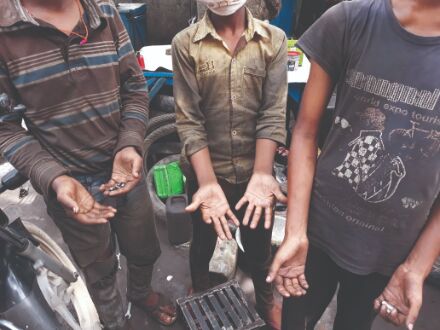At CWCs, kids who cannot understand mortality to those who know it too well
DCPCR has so far identified 59 kids who lost both parents and over 1,300 who lost one parent

New Delhi: As officials at all administrative levels engage in all-out efforts to prepare a list of children who lost parents to the virus in the last few months, interactions with these children when they are produced before the Child Welfare Committees have given a sense of the trauma these children are facing and what it might to take to care for them.
While some children are too young to understand the concept of mortality and keep insisting their father or mother has just stepped out and will be back anytime, others - a bit older - are fully aware of what they are experiencing - even blaming lack of timely medical treatment for their parents' deaths.
According to data compiled by the Delhi Commission for the Protection of Child Rights, so far 59 children have been identified in the city who lost both parents and at least 1,374 children who had lost one parent.
In one such case, three siblings aged between three and 11 years (two daughters, one son) lost their father due to COVID-19. The younger daughter, who is three, believed her father had gone somewhere. Meanwhile, the other two children knew exactly what was happening around them. Their father, a young cab driver, would never come back and they knew this, they told officials. "They said they miss him very much every minute," one of the officials said.
The children's mother has said she will not give up custody but is in between jobs currently and would need financial support.
One of the CWC members told Millennium Post that they also came across seven such children who were themselves infected. "They told us how their parents died. Those who are very small do not know about the deaths. Some said their future is dark. All of them are being counselled and they will be given help from the government," one official said.
Significantly, these officials are having to deal with the emotional trauma of not just kids from poor families but also those from rich and middle-class families.
Generally, children above eight years have an understanding of Covid and its related deaths among their family and friends' circle, one official said. "Not only the poor but also children who were living in posh areas, studying in private schools, may suffer a lot after losing their parents. "They are thinking of how to maintain their lifestyle. There might be many things which were brought through EMIs which still had to be paid and how they will suffer the burden," the official added.
Rashmi Singh, Special Secretary cum Director Social Welfare, and Director at the WCD Department said besides institutional services, they are trying to promote sponsorships too under which CWCs can pass orders regarding the manner of sponsorship based on individual cases .
"Our District child protection officers have been given directions to contact such children and their families and try to connect them with CWC for appropriate follow up," she said, adding that CWCs, after inquiry, can decide on sponsorship, placement with foster care or institutional services.
In two cases, the extended family of the kids have offered to take custody and officials have through constant follow-ups noticed that the children are being cared for.
Chairperson of CWC-1, Meenu Mehta said that as per the J J Act, 2015, with due enquiry, these children are declared Children in Need of Care and Protection (CNCP) by CWC and these CNCP children are provided with the sponsorship that can be given as interim relief and further process different schemes for the rehabilitation of CNCP children.
When contacted, Vaidehi Subramani, chairperson at CWC-II spoke of the steps taken for the welfare of these children. She said the DCPU is preparing a Social Investigation Report as per JJ Act 2015. "CWC is making efforts to link the services to existing government schemes. Also, working on identifying fit persons, fit facilities and foster parents. We are keeping institutional care at CCIs as a last resort," Subramani said.



